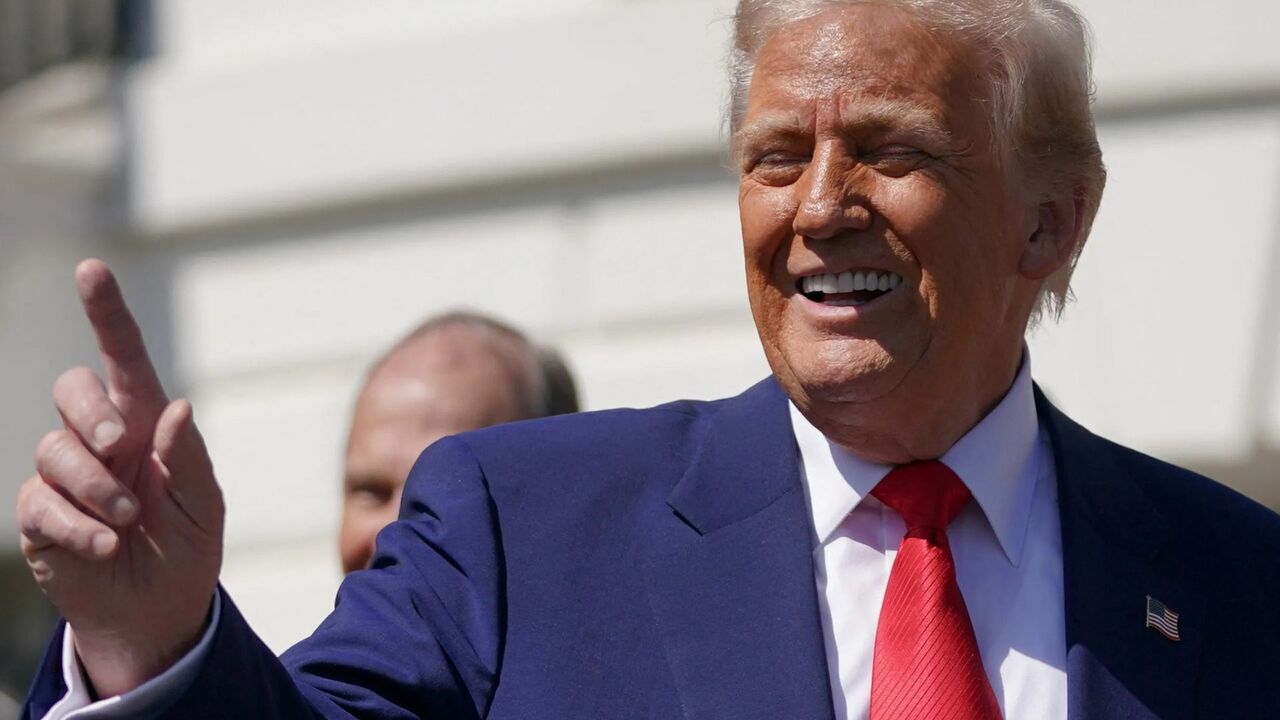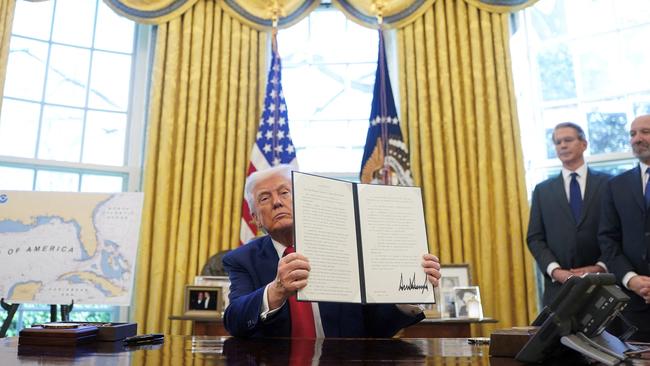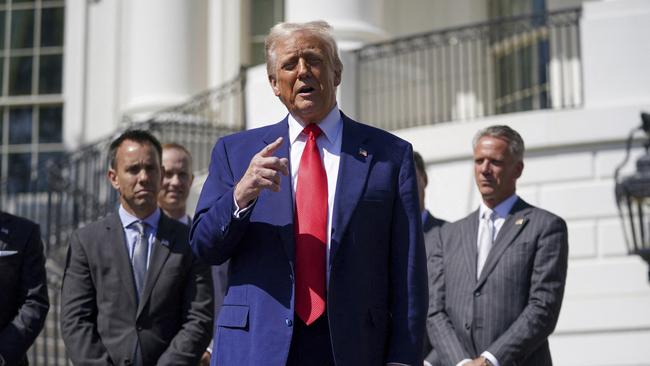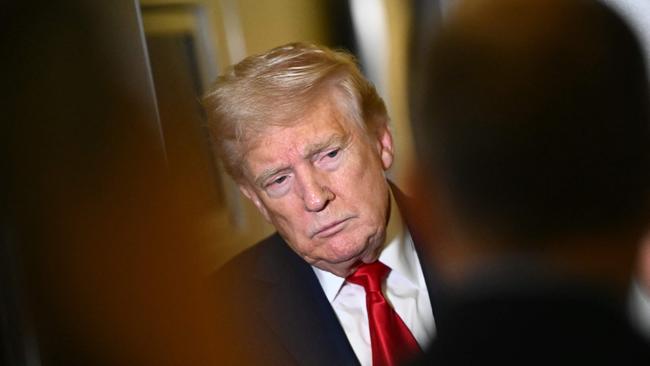Trump warns exemptions on smartphones, electronics will be short-lived, promises future tariffs
Donald Trump has warned that current exemptions on smartphones and electronics are only temporary, with more tariffs on the way. Here’s everything you need to know about the latest tariffs.

North America
Don't miss out on the headlines from North America. Followed categories will be added to My News.
US President Donald Trump has warned the exemption of smartphones, laptops and other electronic products from import tariffs on China will be short-lived and that no one was “getting off the hook.”
“There was no Tariff ‘exception’, Mr Trump said in a social media post. “These products are subject to the existing 20% Fentanyl Tariffs, and they are just moving to a different Tariff ‘bucket.’”
“We will not be held hostage by other Countries, especially hostile trading Nations like China.”
Last week, Mr Trump announced a 90-day pause, reducing the higher-rate tariffs to 10 per cent for almost all countries.
The reversal marked a significant setback for a president who had claimed he was “liberating” Americans from an unfair global trade system—one he insisted only he had the courage to reform.
So with the pause coming to effect, what will this mean now for countries, including Australia?
Here is everything you need to know.
WHAT HAPPENED?
Donald Trump said he will grant an immediate 90-day pause on tariffs above 10 per cent for countries that have come to the negotiating table while dramatically escalating his trade war with China.
It was a meeting on Wednesday morning local time (late Wednesday night AEST) between Mr Trump, US Commerce Secretary Howard Lutnick and Treasury Secretary Scott Bessent which determined the changes to the tariffs.
“I would say this morning, over the last few days, I’ve been thinking about it. I’ve been dealing with Scott, with Howard, with some other people that are very professional. And I think it probably came together early this morning, fairly early this morning, just wrote it up,” Mr Trump said when asked about the timeline by reporters at the White House.

“It was written from the heart. And I think it was well written too, but it was written from the heart.
“It was written as something that I think was very positive for the world and for us, and we don’t want to hurt countries that don’t need to be hurt, and they all want to negotiate.”
Asked later why he decided on the pause, he said: “I thought that people were jumping a bit out of line … they were getting a little bit yippy, a little bit afraid.”
DID TRUMP BUCKLE UNDER PRESSURE?
AMP Capital chief economist Shane Oliver believes Mr Trump’s u-turn decision was done out of economic necessity and that he was risking a “potential meltdown in the US bond market.”
The US bond market is where people buy and sell loans made to the government, companies, and other groups, helping to fund everything from government programs to business growth.
“I think his reversal reflects the growing panic in investment markets with US shares on the brink of a bear market and bond yields rising as investors lose faith in the US as a safe haven.
“Rising bond yields are particularly bad for the US as they mean higher interest costs on their debt making it harder for Trump to cut taxes.
“At least it shows Trump is still sensitive to investment markets which is a good sign.”
Industry Professor and Chief Economist at University of Technology Sydney, Tim Harcourt said the backflip was “totally strategic to isolate China”.
“(This backflip) will help consumers and businesses because tariffs raise prices and hurt consumers and workers,” Professor Harcourt said.
“This reversal could have long-term implications for how the US uses tariffs as a policy tool. Although China was the first to use tariffs as a geopolitical tool against Australia.”
Mr Oliver added: “I think it continues to signal that the US will use tariffs as a policy tool. But this may be far less so and far more considered under a Democrat president. As we saw under Biden.”
WHY IS THE BOND MARKET IMPORTANT?
These bonds set the “risk-free” global interest rate and influence interest rates across the entire financial system.
As money pours in, it drives down interest rates and strengthens the dollar, acting as a buffer against global instability.
This week, that mechanism broke down.
For weeks, money flowing into US bonds was surprisingly low, even amid stock market chaos, causing the dollar to dip.
On Tuesday, the bond market clashed with Trump’s trade war. Instead of money pouring in, it started flowing out. Investors dumped US government bonds, sending yields—essentially interest rates—soaring.

WHICH COUNTRIES WERE SPARED?
The President claimed more than 75 countries had approached his administration to negotiate a deal on the tariffs.
The 10 per cent baseline tariff which applies to all countries, including Australia, will remain in place.
But dozens of countries subject to higher reciprocal tariffs under the policy will get a 90-day break.
Mr Trump said he was granting the pause to countries other than China because they had heeded his warning not to retaliate.
WHY DID CHINA RAISE TARIFFS ON CHINA?
Mr Trump raised tariffs on China to 125 per cent, hours after China boosted taxes on American imports to 84 per cent and vowed to “fight to the end” in an escalating battle that threatens to disrupt trade between the world’s two largest economies.
The new rate levied by Beijing, which has taken effect, comes in response to Mr Trump’s earlier move to raise the tariff on Chinese products to 104 per cent as part of increases that hit US trading partners worldwide. Europe and Canada also hit back with new tariffs on imports from America.
Citing lack of respect, Mr Trump responded by raising tariffs on China to 125 per cent, while pausing tariffs on most countries for 90 days.
The hikes are the latest in an ongoing trade war that threatens to raise prices for consumers in America and derail China’s attempts to reinvigorate its sluggish economy.
WHAT ARE THE ELECTRONICS TARIFFS?
US President Donald Trump warned that no country would be getting “off the hook” on tariffs despite a 90-day reprieve on some levies, while also downplaying exemptions for Chinese technology.
Global markets have been on a roller coaster since Trump’s April 2 tariffs announcement, declining sharply before partially recovering with his 90-day pause on the steepest rates last week.
Most nations will now face a baseline 10 percent tariff for the near-three-month period — except China, which launched a tit-for-tat escalation.
The exchanges have seen US levies imposed on China rise to 145 percent, and Beijing setting a retaliatory 125 percent band on US imports.

Trump’s administration has said it intends to negotiate trade deals, including with China, but it is not clear what terms the president would be willing to accept.
He has long said that US trade deficits are the result of unfair practices that need to be corrected, though his tariffs also hit countries with which the United States has a trade surplus.
“NOBODY is getting ‘off the hook’ for the unfair Trade Balances, and Non Monetary Tariff Barriers, that other Countries have used against us, especially not China which, by far, treats us the worst!” he wrote on his Truth Social platform .
In addition to the general reprieve for other countries, Trump on Friday issued exemptions for Chinese-made semiconductors and electronics, amid warnings that US consumers faced skyrocketing prices for products such as smartphones and laptops.
However, Trump asserted that there was “no Tariff ‘exception’” on those products, saying that they remained subject to a 20 percent rate in “a different Tariff ‘bucket.’”
IS AUSTRALIA IMPACTED?
In Australia, there’s little reason to breathe a sigh of relief over the latest volley in Trump tariff tennis.
We were already facing a 10 per cent levy and that base rate will remain for all countries during the 90-day pause on higher reciprocal tariffs.
The increased hit to China of 125 per cent tariffs, our largest trading partner, will also have serious ramifications for our own economy.
And the pain is likely just beginning with the President warning he still intends to introduce tariffs on pharmaceuticals – one of our biggest exports to the US.
“We still face the 10 per cent tariff on our exports to the US and 25 per cent on steel and aluminum and potentially on pharmaceuticals. And our main export market, ie China, faces a 125 per cent tariff,” Mr Oliver said.
“But it's a bit of a relief in that maybe global growth won’t be hit as badly as feared so that’s why our share market and the Australian dollar have both bounced.
Professor Harcourt added: “It’s a relief for Australia directly (for now).
“But we have to watch what happens to China.”
HAS THE MARKET IMPROVED?
Markets surged as the pause was announced following a tumultuous morning in which both China and the European Union unveiled plans to strike back against Mr Trump’s ‘liberation day’ tariffs which came into effect hours earlier.
The Dow Jones Industrial Average achieved its largest one-day points gain on record when it jumped 2,962.86, or 7.9 per cent to close at 40,608.45.
The ASX 200 jumped 5.8 per cent to 7,809 points in the first 15 minutes of trading on Thursday.
The futures markets had predicted it would rise 6 per cent during the day for the biggest daily gain since March 2020. Overnight the Australian dollar also spiked back above 61 US cents.
WILL BUSINESSES AND CONSUMERS GET RELIEF?
Mr Oliver said it may come as a “relief to consumers and businesses”, but they will still face a big tax hike on any imports they buy and “uncertainty for business as to where to invest.”
“Tariffs will still be way higher than was the case just a week ago with 125 per cent on the 13 per cent of imports that come from China and 10 per cent on everyone else with 25 per cent on on some products and from Canada and Mexico.
“So the tariff hikes are still huge and I don’t expect much improvement in confidence.”
CHINA SUSPENDS RARE EARTH EXPORTS
China has stopped shipping some heavy rare earth metals and magnets critical to US production of everything from cell phones to fighter jets as Beijing’s trade war with Washington simmers.
On April 4, the Chinese government ordered restrictions on the export of six heavy rare earth metals, which are refined entirely in China, as well as rare earth magnets, 90 percent of which are produced exclusively there.
The export halt applies to all countries, but access to elements like dysprosium and yttrium are critical to US industry — especially in the tech, electric vehicle, aircraft and defense sectors, according to Drew Horn, who served as the top US official on strategic minerals and energy supply chain development in President Trump’s first administration
“Rare earths are in everything,” he told The Post, singling out “the EV and auto space … [and] everything from cell phones, defense key components, [and] space travel.”
“China,” Horn added, “has essentially created an all-powerful monopoly with them.”
More Coverage
Originally published as Trump warns exemptions on smartphones, electronics will be short-lived, promises future tariffs





